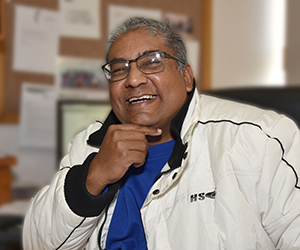
Prof Hussein Solomon, Senior Professor
in the Department of Political Studies and
Governance at the UFS and co-editor of the
book titled Understanding Boko Haram:
Terrorism and Insurgency in Africa.
Photo: Charl Devenish
Understanding the nature of the Boko Haram insurgency in northeast Nigeria is exactly what Prof Hussein Solomon from the Department of Political Studies and Governance at the University of the Free State (UFS) has set out to do.
Understanding the emergence of Boko Haram
Prof Solomon says tens of thousands of people have been killed in northeast Nigeria and neighbouring states as a result of the violence unleashed by the terrorist group. With the help of his co-editor, Prof Jim Hentz, who is an army colonel and lecturer at the Virginia Military Institute in the US, they set out to “understand the emergence of Boko Haram in a historical, sociological, economic and political context”.
In his book, titled Understanding Boko Haram: Terrorism and Insurgency in Africa, Prof Solomon “seeks to understand the emergence of Boko Haram in a historical, sociological, economic and political context”.
Book launch to take place in Chicago in the US
In his previous book, Islamic State and the Coming Global Confrontation, he analyses the origins and organisational structure of the Islamic State. Although an entirely new topic, but within the broad theme of political Islam, this book focuses more on how Boko Haram has become part of the Islamic State’s franchise in West Africa.
The book, which took more than a year to write, is based on secondary research, followed by primary documents and interviews done on the ground in Nigeria. It will be of much interest to students of terrorism and political violence, insurgencies, African politics, war and conflict studies, and international relations in general.
The official launch will take place at the African Studies Association’s annual meeting and takes place from 16-18 November 2017, in Chicago in the US.